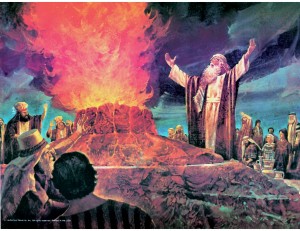“Let me hear what God the Lord will speak, for he will speak peace to his people, to his faithful, to those who turn to him in their hearts. Surely his salvation is at hand for those who fear him, that his glory may dwell in our land.” [Psalm 85:8-9, NRSV]
[L] Elijah and the prophets of Baal on Mount Carmel. [M] Elijah in the wilderness by Washington Allston. [R] Prophet Elijah on Mount Horeb, by Daniele da Volterra..
The psalmist prays with an unshakable faith in the Lord God who hears our prayers from the heart. The words he speaks to his faithful will be words of peace. Sadly, we often lack the same equanimity in prayers, distracted as we are by the cares of everyday life and at times even overwhelmed by the stresses and anxieties caused by the troubles around us. Distractions and anxieties dog us everywhere we go and they seem to block us from the revelation of God
The Bible, however, in both its Old and New Testaments, disclose to us that God reveals himself to us, not in spite of our distractions and anxieties, but right at the very heart of our distractions and anxieties.
Take, for instance, the case of prophet Elijah. He had confronted the evil of Israel’s idolatrous kingdom at Mount Carmel and was victorious. Chapter 18 of the First Book of Kings makes for a very interesting reading of the battle of prophets – prophets of the Lord God and prophets of Baal. We cannot resist quoting that little snippet in which Elijah scolded the people:
- “How long will you go limping with two different opinions? If the Lord is God, follow him; if Ba’al, then follow him.”
It was a battle royal between a lone-ranging prophet Elijah and 450 prophets of Baal gathered by King Ahad. In the end, Baal was proven to be utterly fake and non-existent. So Elijah had all of Baal’s prophets rounded up, brought down to the brook Kishon, and there put to death [1 Kings 18:17-40]. The punishment for idolatry was very dire indeed.
Elijah’s victory, however, was short-lived, incurring for himself the wrath of Queen Jezebel. Abandoned and alone, Elijah fled into the wilderness. The forces leveled against him were just too great, vanquishing completely his fighting spirit. Now, he was alone and despondent in the wilderness, longing only for death as his final relief. Crouching low like a political refugee, Elijah had all but given up on this miserable ministry in the name of God. Truly, he encountered the darkest hour in his service to God. That was the true context against which we must comprehend God’s revelation to the prophet Elijah. He who laboured faithfully for God, must have longed for God’s intervention to destroy the enemies of Israel. But he had waited in vain. God’s intervention did not happen.
And yet, in the depth of that desolation, an angel of God twice came to him, first to deliver him food and to urge him to eat so as to have the strength for forty days and forty nights, and next to set him off on that long journey to Mount Horeb, the mount of God [1 Kings 19:1-8]. There, the Lord God brought him to the cave for an epiphany within the usual symbols of divine power. The sequence of events happening right before Elijah’s eyes has made for a captivating catechetical story-telling ever since this oral tradition was first circulated:
- Behold, the Lord passed by.
- A “great and strong wind rent the mountains and broke in pieces the rocks before the Lord, but the Lord was not in the wind.”
- “After the wind an earthquake, but the Lord was not in the earthquake.”
- “After the earthquake a fire, but the Lord was not in the fire.”
- “After the fire, a still small voice.”
Elijah knew at once the voice of God in that “still small voice.” On hearing that gentle voice, Elijah “wrapped his face in his mantle and went out and stood at the entrance of the cave.” There, the Lord God conversed with him, giving him instructions, assuring him of his presence.
What Elijah experienced on Mount Horeb that day is the stuff good for our instructions. In the midst of the turmoil in his own life, the prophet Elijah discovered that the Lord was not in the mighty wind, nor in the earthquake, nor in the fire, but in the still and gentle breeze. In the midst of the clatters of the world, we need do meditate and contemplate God who is present to us in a tiny whispering voice. Christians are easily reminded of the words uttered through the psalmist: “Be still and know that I am God” [Psalm 46:10].
Whenever the events in our lives take us to a point of anxiety and fear, we naturally long for some dramatic change of circumstances that will deliver us from our plight. It is only natural that our thoughts are dominated by the forces that threaten to overwhelm us. From Elijah’s experience, we learn the crucial lesson that at the heart of our fear and anxiety, hidden beyond the wind, the fire and the earthquake – all symbols of turmoil and overwhelming forces – is the stillness which is the object of our longing. As we give time to prayer, the Spirit stills our hearts and quiets our clamorous anxiety. It is only then, that we experience a peace that transcends all fear.
In the New Testament, the Gospels reveal Jesus as the peace at the heart of our fearfulness. The episode of Jesus walking on water and with him, Peter as well, stands as a classic example of the peace of Jesus conquering the fearful anxiety caused by worldly distractions [Matthew 14:22-33]. This latter was displayed by Peter who attempted to walk on water, succeeded for a moment, but soon sank the moment he became distracted and even overwhelmed by the howling winds and menacing waves around him.
In Peter’s cry for the Lord’s help and getting it, we see a perfect echo of Elijah’s experience: the Lord’s answer of peace is hidden in the heart of our fearfulness. We need to be still to find it. Be still. Listen.
Copyright © Dr. Jeffrey & Angie Goh, September 2013. All rights reserved.
You are most welcome to respond to this post. Email your comments to us at jeffangiegoh@gmail.com. You can also be dialogue partners in this Ephphatha Coffee-Corner Ministry by sending us questions for discussion.



